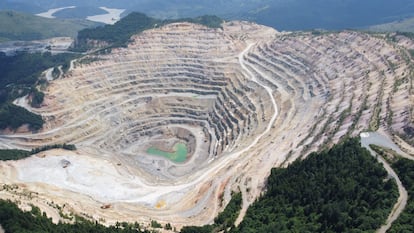Romania rediscovers its hidden treasure: Minerals
The EU’s push to reduce dependence on critical materials is giving a second life to several abandoned mining projects


It has been 21 years since Romania shut down Europe’s largest graphite deposit, citing unprofitability. Today, the site in Baia de Fier — a commune 235 kilometers west of Bucharest — is a desolate landscape of crumbling buildings, rusted machinery, and decaying metal structures. But this once-abandoned mine is now on the verge of being revived by the Romanian Salt Company thanks to shifting geopolitics.
The graphite deposit, which once employed around 500 workers, will receive nearly €200 million ($227 million) to awaken from its long slumber, as it has been designated one of three strategic objectives in Romania announced by the European Commission at the end of March. The initiative aims to reduce Europe’s dependence on critical materials — particularly from China — amid the changing global geopolitical order.
In total, Romania will receive €615 million ($698 million) from Brussels. “Graphite extraction will boost technologies in the automotive industry, such as electric vehicle batteries and energy storage systems, as well as in electronics and machine manufacturing,” explains Andreea Nestian, financial director at A3Build, a consulting firm specializing in mining.
The two other valuable materials the EU has targeted for extraction in Romania are metallic magnesium, in Budureasa, and copper, in Rovina — both also located in the western part of the country. “Magnesium is a metal used in the production of lightweight alloys for the automotive, aerospace, and defense industries,” Nestian adds, emphasizing that the EU is almost entirely dependent on imports of the material.
As for the copper deposit in Rovina, it is considered the second-largest in Europe, according to Euro Sun Mining, the Canadian company holding the exploitation license. However, its extraction project is the most controversial of the three. Environmentalists have secured favorable court rulings to halt certain investments.
“Although it is not a rare mineral, copper is in growing demand due to its importance in semiconductor manufacturing, wind turbines, and industries such as automotive, aerospace, and defense,” the consultancy adds.
In search of aid
“Romania offers countless resources that member states could leverage, but the local administration lacks the human and financial capacity to do so on its own,” says Nestian.
For this reason, Romanian authorities have already informed Brussels that the country has access to additional types of metals — including titanium, boron, quartz, phosphorus, germanium, tungsten, gallium, and rare earth elements —in a bid to secure further financial support.
“They are all important and cannot be separated,” says Romanian Minister of Economy Bogdan Ivan.
These minerals, he continues, can be used in many fields: from aerospace and aeronautics to electronics to medical equipment, as well as solar and laptop batteries. They also have applications in semiconductor technology, mobile communications, GPS, the internet, fiber optics, automation, and electronics, says Ivan. The Ministry of Economy highlights their role in the defense industry and emphasizes two especially critical categories of raw materials: rare earths and titanium.
“We extract and process tens of thousands of tons of raw materials essential for the industries of the future,” says Ivan. Currently, there are 13 active licenses for the exploitation of metallic minerals and mining waste.
A start date for mining operations has not yet been specified. The Romanian government plans to submit the mining project to the European Commission in the third quarter of this year. However, experts caution that external support will be essential. Many of the former workers are now retired or have emigrated in search of employment. Meanwhile, Romania’s only faculty of mining is struggling to attract students due to widespread disinterest in an industry that has been in decline since the fall of the communist regime.
“It will require a lot of investment and skilled labor,” Nestian concludes.
Sign up for our weekly newsletter to get more English-language news coverage from EL PAÍS USA Edition
Tu suscripción se está usando en otro dispositivo
¿Quieres añadir otro usuario a tu suscripción?
Si continúas leyendo en este dispositivo, no se podrá leer en el otro.
FlechaTu suscripción se está usando en otro dispositivo y solo puedes acceder a EL PAÍS desde un dispositivo a la vez.
Si quieres compartir tu cuenta, cambia tu suscripción a la modalidad Premium, así podrás añadir otro usuario. Cada uno accederá con su propia cuenta de email, lo que os permitirá personalizar vuestra experiencia en EL PAÍS.
¿Tienes una suscripción de empresa? Accede aquí para contratar más cuentas.
En el caso de no saber quién está usando tu cuenta, te recomendamos cambiar tu contraseña aquí.
Si decides continuar compartiendo tu cuenta, este mensaje se mostrará en tu dispositivo y en el de la otra persona que está usando tu cuenta de forma indefinida, afectando a tu experiencia de lectura. Puedes consultar aquí los términos y condiciones de la suscripción digital.








































